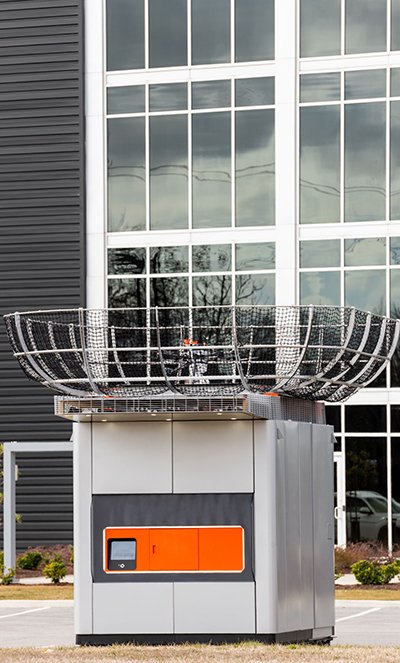DroneUp announced that it has achieved a new industry benchmark of 500 deliveries made in a single day while also dramatically improving the pilot-to-drone ratio required to safely accomplish each flight.

The key to a sustainable drone delivery industry is to achieve a scale that’s feasible for commercial sellers while meeting customers’ increased demands. From its research and development facility at Richard Bland College (RBC), DroneUp rigorously performed capacity testing on behalf of the company’s commercial partners. Relying on a Beyond Visual Line of Sight (BVLOS) waiver, over the last several months, the team has focused on automating the delivery process. In doing so they have achieved the following:
- Increased Deliveries Per Hour – DroneUp has reached a new industry benchmark with a record-setting 40 deliveries per hour carrying up to 10 lbs weight capacity.
- Improved Pilot-to-Drone Ratio – Automation testing has achieved a one-to-many operator-to-drone ratio, which aids in driving down the cost of delivery for DroneUp’s partners.
- Leveraging Innovative, Proprietary Software – Uncrew: DroneUp’s Cloud-Based platform allows users to manage missions from anywhere globally, utilizing real-time geodata from UTM for accurate airspace, terrain, and traffic information. Automated mission plans are generated from HubOps Mission Requests, allowing operators to safely and efficiently oversee up to 20 concurrent missions through a unified interface.
“We are excited about this achievement but it’s only the beginning of what’s possible. Our work in driving volume while ensuring the reliability and safety of our system is ongoing,” said Tom Walker, CEO of DroneUp. “Coordinating package loading, energy management, and safety are critical but also challenging to scale. Our team has optimized ground logistics to ensure that we can maintain high delivery volumes without compromising on safety or efficiency and most importantly, drive costs down.”
What’s Next for Testing? Increased Capacity & More Flights Per Hour
Achieving more deliveries through automated processes will eventually be met by an increased number of deliveries from drones capable of carrying more weight.
“For DroneUp’s commercial partners, the ultimate goal is to increase the number of deliveries that can be safely completed while diversifying the types of items and packages that drones can effectively manage,” said John Vernon, CTO of DroneUp. “Testing at RBC will soon address new weight capacities that eclipse our 10-pound limit, further increasing the package size and testing of many-to-many drone operations”
Customers Who Have Experienced Drone Delivery Love It
DroneUp recently completed a survey of customers who used drone delivery in Q4 2023. Included among the findings was drone delivery earned over 90% positive ratings on having packages arrive safely, on time, and in perfect condition. For retailers, the survey illustrates that drone delivery is driving incremental purchases with 36% of survey respondents acknowledging that they found additional items to add to their cart.
The UAV Industry’s First Autonomous Ecosystem
DroneUp remains the first and only provider to invest in a future defined by scalable, and economically feasible drone delivery for retailers, quick service restaurants, healthcare, and other businesses. Grounded in innovation, the DroneUp Ecosystem combines automated ground infrastructure, a suite of software operating systems, and an autonomous drone platform in a revolutionary new way. Learn more here.
Walker continued, “At the same time as the FAA begins to open air space for simultaneous drone deliveries, our Ecosystem has been through its own rigors of testing and is ready to meet the moment. Its proven design makes the economics of drone delivery feasible for retailers while providing intuitive accessibility that brings unprecedented convenience to end-users.”



